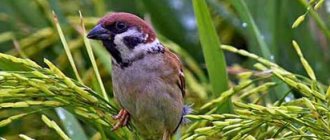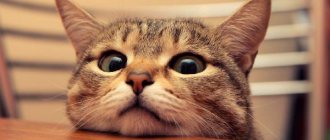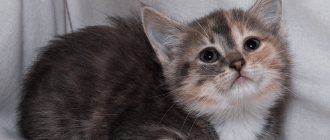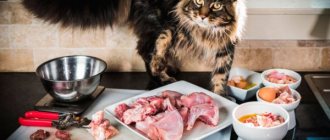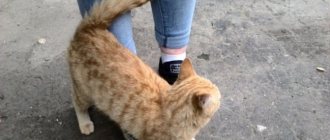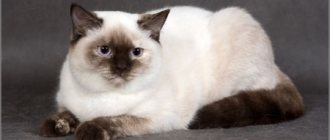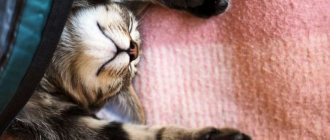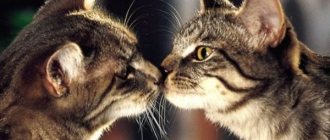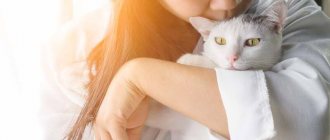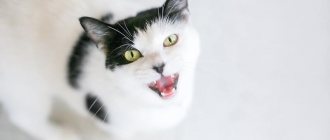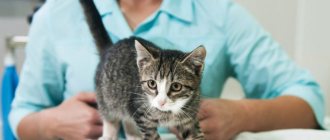What will you learn from the article?
- Prohibited foods for cats Products that should not be abused
Some owners mistakenly believe that picky and squeamish cats will never eat anything harmful or dangerous. Yes, cats will not eat spoiled meat, but they will gladly try canned tuna from the master’s table, and this is dangerous for them! This article describes in detail what cats should not eat.
There is a whole list of foods that are harmless and healthy for humans that cannot be fed to cats and kittens. Familiarize yourself with it, and be responsible - make sure the food is safe for your cat by offering her a bite from your plate.
Let's look at foods that kittens and adult pets should not eat.
Features of structure and natural nutrition
Felines naturally eat animal foods. Meat forms the basis of their diet. Only some species of wild cats eat fish and bird eggs. They are exclusively an addition to the diet and help diversify it.
Cats do not synthesize enzymes in their digestive tract that digest plant foods. The predator obtains all the substances produced by plants by eating the herbivore’s stomach. It contains plant residues that have already been processed with the necessary enzymes.
In rare cases, a cat will feast on plants. She does this in order to cleanse the intestines of hairballs and small undigested remains - skins, bones, feathers, claws. Some processes and feeding skills are “recorded” in domestic carnivores at the genetic level, while others they master during the learning process.
Therefore, the eating habits of pets are somewhat different from their counterparts living in the wild. It is believed that the cat will not eat harmful and spoiled foods. However, street animals eat in garbage dumps, and the food there is not the freshest. It’s true that such animals live 5 times less than pets.
In order for your pet to live as long as possible and have excellent health, its diet must meet certain requirements and consist only of healthy foods.
What to do to prevent your cat from eating junk food
Your cat's health directly depends on what you feed it. A balanced diet, adherence to a diet and keeping harmful foods out of the reach of your pet are the key to your pet’s health and longevity.
Follow our simple tips and your pet will never eat anything dangerous:
- Don't feed your cats table scraps. Stop children from doing this.
- Don't be tempted to give your pet something tasty. Cats should eat their own food and special cat treats.
- Do not allow cats to sit near the cutting table while preparing food - you may not be able to keep an eye on your pet, or he will steal a dangerous piece.
- Be especially attentive to your cat during holiday feasts. Make sure your pet doesn't accidentally eat something unwanted. Prohibit guests from giving your pet treats.
- Keep food out of your cat's reach. In the case of kittens and overly inquisitive pets, it may be necessary to install locks on food cabinets.
- Keep your cat away from the trash can.
If you suspect your cat has eaten something unwanted, take her to the vet immediately.
Meat and offal
They are the basis of the diet and should make up 40-60% of the daily portion. Preference should be given to raw meat, since the cat’s gastrointestinal tract has all the necessary enzymes for its digestion and absorption. Fresh meat satisfies natural instincts, cleanses and strengthens teeth, and provides the body with healthy proteins.
Some albumins needed by the cat's body are not synthesized in the body, like in other carnivores. Therefore, the diet of a domestic cat should contain 2 times more animal proteins than, for example, dogs. But some types of meat and offal can pose a health risk to your domestic cat.
Fatty meats - pork, lamb - cause excess cholesterol, which causes atherosclerosis and heart disease. Thermally untreated meat may contain helminth eggs, toxins, and pathogens. Therefore, it needs to be frozen or boiled.
But proteins denatured under the influence of high temperature cannot fully ensure the processes of tissue synthesis. Preference should be given to frozen or tested fresh meat.
By-products are no less valuable for the cat’s body. Giblets are divided into 2 categories:
- The first includes the liver, kidneys, tongue, brains, and heart. In terms of the amount of protein they are not inferior to meat, they contain little fat and are easily digestible. They are subject to the same processing as meat and can replace it.
- The second category is the stomach, trachea, heads, ears, lungs, legs, tails. They are less valuable, but there are much more of them in finished feeds than category 1 by-products. After boiling, they can also be added to the cat’s food. However, you shouldn’t get carried away with them, despite their cheapness.
The liver and kidneys are natural filters, and their tissues accumulate toxins, antibiotics, and growth hormones, which are used in breeding poultry and livestock. They cause digestive disorders, diarrhea, and allergies.
They are light, contain little fat, and are not inferior in protein to veal tenderloin. Cats happily eat lungs, but if there is dysfunction of the joints, a tendency to dysplasia and salt deposition (gout), they and other by-products should not be given to the animal. They cause progression of the disease. For old animals, the amount of by-products should be limited as much as possible or eliminated altogether, especially liver.
Why can't cats eat fried food?
Feeding your cat fried food is unacceptable. It is poorly absorbed, frequent use causes digestive upset, and metabolism is disrupted. If excess oil, salt and spices are used during cooking, serious problems with the liver, stomach and other organs of the digestive tract can occur.
Kisul should be fed not fried meat, but well-frozen meat. It is divided into portions and stored in the freezer, defrosting as needed. Boiled meat is digested worse than raw meat and is not as healthy.
Meat products
Sausages, sausages, pates and other meat products are very dangerous for the cat’s body. In addition to the fact that they contain hidden fats, they contain spices, large amounts of salt, preservatives, flavor enhancers, soy, starch, and dyes. All of them are harmful to domestic cats and cause obesity, heart and circulatory system diseases, diarrhea, allergies, and intoxication.
Even if an adult cat carries them in small quantities, they can become deadly for kittens and older animals. According to scientific research, frequent feeding of cats with sausage products increases the risk of pancreatic cancer by 15-20%.
Useful video
What not to feed cats and kittens, advice from a veterinarian.
Get to know interesting cat breeds with the help of our encyclopedia: Havana Brown, Dwelf, Manx.
What grass do cats eat and why?
What to feed a kitten?
Fish
Despite the widespread belief that cats love fish, it should be given to the animal very carefully. River fish is strictly prohibited.
In addition to the fact that it may contain eggs and larvae of worms, it contains a large number of thin, sharp bones. It's difficult to get rid of them completely. Once in the esophagus and stomach, the bones can get stuck in the mucous membrane, injure it and cause inflammation, suppuration, and tissue necrosis.
Modern open reservoirs contain most of the periodic table. Harmful substances accumulate in the meat and bones of fish. Eating such a product will not add health to your pussy. But endogenous substances from raw fish also pose a danger to cat health:
- the enzyme thiaminase destroys vitamin B1;
- trimethylamine oxide reacts with iron, preventing its absorption;
- The “fish diet” disrupts the synthesis of vitamin K and the absorption of vitamin E.
As a result of hypovitaminosis, internal processes are disrupted, anemia, hemorrhage, brain damage, and infertility appear. Veterinarians especially do not recommend giving cats fish from the carp family. They have the highest thiamine content.
Sea fish and seafood contain large amounts of iodine. Animals need it. But cats are not able to absorb too much of it. Frequently feeding your pet fish and seafood causes hyperthyroidism.
Fish also contains a lot of phosphorus. If it is not compensated by the same amount of calcium, it begins to be deposited in the form of stones in the kidneys and bladder. The risk of developing urolithiasis increases in older and neutered cats.
It is better to give sea fish, completely deboned and boiled, since fish proteins are strong allergens.
What not to feed a kitten
The nutrition of a small fluffy cat needs to be given more attention than an adult cat, since its digestive system is just developing. Proper nutrition for a kitten is the key to the health and well-being of your beloved pet.
If we talk about the nutrition of kittens, then they should not be given all the foods that are prohibited for adult cats.
The exception is milk.
Babies should not be given cow's milk, as it has too high a fat content - the kitten's stomach will not be able to digest it. If the kitten is still small and needs milk, then purchase goat milk or cat milk substitutes from veterinary stores. It is allowed to give kittens fermented milk products with low and zero fat content.
Fish (river, sea) is not very healthy for kittens - it can only be given boiled and without bones no more than 2-3 times a week. All food from the table is prohibited for both adults and kittens - it contains a lot of spices, salt, and artificial additives. This is not a natural food for babies - there is no need to pamper them with a piece of sausage or sausage.
Industrially produced dry food is allowed for kittens, but if you choose this type of food, remember, you should not give Whiskas. It is necessary to feed high quality food that is formulated for kittens.
Important!
You cannot feed your kitten monotonously, for example, only fish (meat). A monotonous diet will not bring a sufficient amount of micro- and macroelements to the body of a growing animal.
Sweets, baked goods, baked goods
Cookies, sweets, chocolate, buns and pasta are a source of huge amounts of carbohydrates. They cause obesity, diabetes, caries and other pathologies in cats. A cat gets its energy from proteins. It is able to utilize carbohydrates, but in small quantities.
In the wild, cats consume no more than 5%. In ready-made dry food this amount increases to 20-30%. But there, foods containing carbohydrates are processed so that they are quickly absorbed. Thus, the manufacturer reduces the price of feed by reducing the amount of meat. Therefore, cats develop diarrhea, increased gas formation and fluid retention when exposed to certain types of food. Unprocessed carbohydrates from sweets and baked goods increase the risk of developing pathologies.
Natural chocolate is especially dangerous for cats. Cocoa beans contain caffeine and theobromine, which have a stimulating effect on the nervous system. A small piece of dark chocolate or chocolate candy can cause a heart attack, short-term neurological disorder, severe thirst, convulsions, and excessive agitation in your pet.
Some information about water
It is also necessary to say about water. The excretory system of cats is designed in such a way that urine accumulates quite slowly and becomes more and more concentrated. But this does not mean that the pet can live for a long time without fluid.
Rare water consumption by a cat does not mean that you can save on it
The cat must be provided with access to fresh and clean water. Moreover, its quality needs to be given increased attention. If tap water can be used for cooking without any problems, then it is also suitable for a cat. Otherwise, it is better to give your cat bottled water.
By the way! If your pet has a tendency to drink tap water, it is better to stop him from this hobby. Plaque can accumulate in tap water, which will later settle on the walls of the cat’s stomach.
Read below about the existing types of water and the degree of their usefulness for the cat’s body.
Which water is healthier for a cat?
Milk and dairy products
In mammals, which include domestic cats, milk is a necessary product only in the first months of life. It can be used in the preparation of milk porridges for up to six months. In adult cats, the level of lactase, an enzyme that digests milk proteins, decreases significantly. Therefore, feeding adult animals with milk causes vomiting, diarrhea and other dyspeptic disorders.
Casein in milk causes allergies. Also, herbicides and fertilizers come into milk from plant foods, and growth hormones and antibiotics from the animal’s blood. All this is harmful to the cat's health. Even pasteurized milk is harmful. Pasteurization reduces the absorption of calcium and changes the structure of substances and compounds. Once in the animal's body, they change the course of biochemical reactions and disrupt metabolic processes.
It is recommended to introduce fermented milk products into the diet of cats to strengthen bones and normalize intestinal microflora. However, with a high fat content, instead of benefit, the animal is at risk of heart attacks, obesity, and atherosclerosis.
Some owners like to pamper their pet with a piece or two of hard cheese. If the measure is followed, it is safe, but cheese contains a lot of salt, and casein can cause a serious allergic reaction.
Vegetables and fruits
A small amount of vegetables helps saturate the body with fibers that stimulate the evacuation function of the intestines, vitamins and elements. But they can also pose a danger to the cat’s health.
Potatoes, corn and bananas - the starch from these foods is not processed in the cat's body. It reduces intestinal motility, causing constipation and serves as a substrate for bacterial growth. These products cause fermentation in the intestines and the formation of large amounts of gas. The same effect is obtained when legumes are introduced into the diet - peas, soybeans, beans.
Other plants are also dangerous:
| Types of plant foods | Consequences of use |
| Fruits | Increased gas formation, obesity |
| Citruses, pineapple, kiwi | Vomiting, diarrhea |
| Grape | Severe poisoning |
| Persimmon | Enteritis |
| Rhubarb | Renal dysfunction, diarrhea |
| Nuts, spinach | Urolithiasis disease |
| Soybeans, alfalfa | Hormonal imbalance |
| Garlic, onion | Anemia |
| Nightshades (tomatoes, eggplants) | Poisoning. |
You should not exceed the amount of even healthy vegetables in your diet. They are mixed with meat and fish, since cats only rarely eat them with pleasure.
Can cats have sprats in oil?
Cats love the smell of smoked fish and canned food. They especially like sprats, which should not be fed to pets often. Some pet owners advise giving this product to treat constipation in kitties. They have a laxative effect, but sprats should not be used for this purpose.
Fish has never been the basis of feeding. It should not be used in the diet more than twice a week; more frequent use has a negative effect on the kidneys. It is even more dangerous to feed your cat canned fish. Sprats are smoked, flavored with a lot of oil.
If cats eat canned food often, complications arise:
- hair loss due to an allergic reaction;
- urolithiasis or liver failure develop due to a lack of calcium and excess phosphorus in the body;
- muscle spasms and cramps are observed, as vitamin B is destroyed by thiamine.

